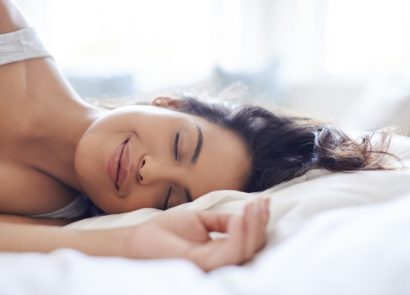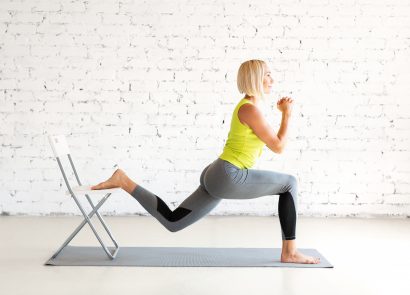Tired of feeling tired? Join the club. According to a study by Aviva, 67 percent of UK adults suffer from disrupted sleep, and nearly a quarter manage no more than five hours a night – yikes.
But all is not lost, so before you think about checking into a sleep clinic, these tips from the experts will help you understand how much sleep you actually need, the tools for a stable bedtime routine and ways to sleep easily. No counting sheep required!
How much sleep do you really need?
While it can be tempting to ignore that alarm and bury your head deeper into your pillow, having too much sleep can actually have an adverse effect and potentially have you waking up tired after eight hours. Here’s how to get a peaceful sleep and establish an evening routine that works for you.
The ideal sleep wake cycle
“Sleep is essential for your body to function and healthy adults need between seven to nine hours of shut-eye per night,” says Dr Diana Gall from Doctor-4-U. “So if you usually wake up at 6am, you should aim to be asleep for 10pm. When we don’t get enough, it can affect certain processes such as memory formation, reaction times, and even the amount of stress that we experience.
“When we become sleep deprived, levels of the stress hormone cortisol are elevated and over time, increased levels of this can contribute to some serious health concerns, such as high blood pressure, heart disease, stroke, obesity and diabetes.
“You may also feel more on edge owing to the elevated levels of the stress hormone. As well as the above concerns, a lack of sleep can also make you hungrier, and contribute to weight gain owing to an imbalance of the appetite-regulating hormones, leptin and ghrelin.”
The benefits of REM sleep
“The benefits of a decent night’s sleep include a stronger immune system, faster reactions, regulated appetite, improved memory, faster healing, an increased ability to learn or retain information, and a decreased risk of some of the major health conditions,” says Dr Gall.
“Getting a good night’s sleep is also about making sure that the quality of your rest is good enough, as some conditions, including sleep apnoea, can affect it, so even if you sleep from 10pm-6am, you may be missing out on vital sleep stages such as deep sleep and REM (rapid eye movement) sleep.
“These two stages help the immune system, repairing tissue damage and processing memories and information. Without this you can end up being sleep-deprived, even if you go to bed early enough.”
Optimise your bedtime routine
“To make sure you’re getting good quality sleep, it might help to limit the amount of blue light that you’re exposed to in the hours before bed,” says Dr Gall. “This means putting away the electronics. However, during the day, we want to be increasing our exposure to sunlight in order to regulate our body’s natural circadian rhythm which is responsible for our sleep and wake cycles and the production of melatonin.
“Other helpful tips include limiting caffeine after lunch, avoiding naps, and making sure that you’re in a regular sleep routine by going to bed and waking up at the same times each day – even on weekends. If you still find that you’re struggling, melatonin supplements can help your body prepare for sleep.”
This is how to get to sleep earlier
“The effects of stimulants can take hours to wear off and can have a big impact on how quickly you fall asleep and the quality of it when you do,” says Cheryl. “Nicotine causes your heart rate and alertness to increase, meaning that you feel more awake before you go to sleep. It enters the bloodstream within a few minutes, but after a few hours it will begin to leave your body and, due to its addictiveness, your brain will wake you up for more nicotine, causing a more disruptive night.
“Meanwhile, alcohol may make you feel drowsy, but it can disrupt you later in the night and won’t allow you to fall into the deep sleep that you need. Avoid caffeinated drinks like tea and coffee before bed, however some studies suggest that malty drinks or warm milk could aid sleep.”
How to get a comfy sleep
“A comfortable and supportive bed is vital,” says GP Dr Riccardo Di Cuffa from Your Doctor. “Don’t underestimate the power of a good mattress. It should be flipped every three months to prevent indentation, and clean sheets are important, too.”
Minimise sleep disturbances
“Take some time out to wind down before you go to bed with activities like reading or taking a bath,” Cheryl recommends. “It may be worth writing a ‘to-do’ list for the following day, so you can organise your thoughts and clear your mind of any stress or anxiety.”
Use magnesium
“Consider taking a magnesium supplement, a powerful relaxation mineral, before going to bed,” advises Suzy Glaskie, functional medicine certified health coach and founder of Peppermint Wellness. “Or you could run a hot bath and add magnesium-rich Epsom salts.” Tea to help sleep could also be worth searching for in your local supermarket!
Get into good sleep habits
“If you can’t get to sleep, or wake up in the night, get out of bed,” says Kathryn Pinkham, NHS insomnia specialist and founder of The Insomnia Clinic. “The longer we lie in bed trying to fall asleep, the more frustrated we get. This means we relate our bed to feeling stressed and being awake, so you’re better off leaving the bedroom and doing something relaxing, such as reading, then going back to bed when you’re tired for a healthy sleep.”
Try visualisation as a sleep aid
“Find a quiet place and sit in a relaxed position with your eyes closed,” says hypnotherapist Ailsa Frank. “Then, visualise yourself walking along a beach, with the waves coming in and out on the shore. Imagine the beach represents your whole life, and each grain of sand symbolises your skills, talents and experiences.
“Imagine you are holding a handful of sand that represents your stresses. See how small the sand grains are in comparison with the vastness of the whole beach. Allow them to slip through your fingers as you imagine letting go of your problems and the waves washing them away. There will always be things we have to deal with in life, so you will always have a small pile of sand in your hand, but you can let it go each day. Try this technique on the train or bus home, or after dinner in the evening to relax.”
Napping is a no-no (sorry)
“If you are having trouble sleeping at night, you could be tempted to catch up with a light sleep when you finish work in the evening,” says Cheryl. “The more you nap, the less likely your body will be ‘ready’ for sleep when the time arrives to go to bed. If you feel like you are getting tired during the day, stand up and take a walk, get some fresh air or do something that will challenge your brain for a while, such as a crossword or word search.”
Do the rapid eye-blinking technique to become a sleep pro
“This technique relaxes you and tires your eyelids,” explains Ailsa. “Lay in the dark with your eyes open. Begin slowly counting backwards from 300 in your mind until you feel you can’t keep your eyes open any longer. Then blink rapidly, as fast as you can, for 30 seconds, or until your eyelids begin to feel heavy. When you can’t blink your eyes any more, close them, and feel yourself let go as you drift off to sleep.”
Techniques to sleep better
We all want to increase our sleep quality, but can’t get enough of it – those are sleep facts! With almost a third of the nation browsing the internet, one in five checking their phone or tablet, and 21 percent drinking alcohol in the hours before bed, it’s no wonder we’re a nation with a nocturnal existence.
But, with a few changes to your nightly routine, here’s how you can fall asleep not only naturally, but also in just one hour. Sweet dreams!
Use essential oils for sleep
“There are many essential oils that can aid relaxation to induce sleep naturally and safely without nasty side effects,” explains Sharon Lovett from Base Formula. “Chamomile, lavender and neroli are three of the most useful oils, as they have a profoundly calming, soothing and balancing effect on mind and body.
“Other useful sedative oils are benzoin, bergamot, cedarwood, clary sage, sandalwood, sweet marjoram, sweet orange, valerian and vetiver. It’s good to vary the oils you use; particularly if you’re using them for more than a couple of weeks, as the body soon gets used to them.
“Diffuse essential oils an hour before bedtime – try six drops of sweet orange, two drops of chamomile and two drops of neroli. Or, simply pop a few drops of oil onto a tissue or cotton pad and place it in your pillowcase – try one drop each of cedarwood, chamomile and lavender.” This shows that sleeping pills aren’t always the answer!
Steer clear of blue light
Allow yourself time without blue lights before bed. This means no phone, TV, or other electronic devices. Instead, try light therapy and allow the gradual dimming of lights to help let your body know that the day is over and it’s time to switch off.
“Humans depend on light, but modern lifestyles have our bodies so confused and, in effect, often fatigued and sleep deprived,” says Jonathan Cridland from Lumie. “Light is a natural stimulant that helps you feel positive, upbeat and full of life, as well as keeping your circadian rhythm on track. By recreating a gradual sunset with a light simulated clock, such as the Lumie Bodyclock Spark 100, it allows you to wind down completely and feel ready for sleep. Equally, the next day you wake up refreshed with a brightening sunrise-through-dawn simulation.”
Take a bath
“Aside from being relaxing and warming, having a bath before bedtime can actually help to promote better sleep and induce tiredness,” says Neil Robinson, chief sleep officer at Sealy UK. “The drop in body temperature experienced immediately after you’ve got out of a hot bath is a great way to mimic the body’s natural decrease in temperature as it prepares itself for sleep. This includes feelings of drowsiness and readies you for a good night’s rest.”
Do some Pilates
“Doing a few Pilates moves is a great way to aid a restful night’s sleep,” explains Lyndsay Hirst, physiotherapist and founder of Your Pilates Physio. “The moves increase serotonin levels, which are known to help sleep. The combination of breathing techniques with muscle and joint stretches also makes Pilates an incredibly relaxing workout to do before bed.
“My suggestion would be to do 10-15 minutes before dozing off. Start by doing some standing shoulder rolls – standing in a relaxed but tall position, lift your shoulders towards your ears as you take a big deep breath in. Exhale as you draw your shoulders back. Repeat five to 10 times.
“Next, try hip twists: lay on your back with your knees bent, feet and knees together and your arms out to the side. Inhale to prepare, then as you exhale, drop your knees to the right and, at the same time, turn your head to the left. Inhale to return, exhale and repeat on the opposite side. Repeat five to six times.”
Try breathing techniques
“Breathing is the only system in your body that is both automatic and also under your control,” explains Richie Bostock, breathwork expert. “The next time you are struggling to get some shut-eye, try a style of breathing called 1-2-1 breathing. The ‘1-2-1’ refers to the length of each step of the breath, which is one part inhale, two parts exhale and one part pause.
“To start, put one or both hands over your belly button and, when you breathe in, inhale through your nose and feel your hands rise a few centimetres and then fall a few centimetres as you exhale. Then, try extending the length you inhale and exhale each time. Repeat until you drift off to sleep.”
How to create a sleep haven in your bedroom
Having the perfect setting for a good snooze shouldn’t just be for World Sleep Day! Use these tips to create a relaxing setting all year round.
Invest in the right duvet
“The correct duvet will keep you at just the right temperature so you’ll enjoy deep sleep every night, even if it’s cold outside,” advises Neil Robinson, chief sleep officer at Sealy UK. “Opt for a 13.5-15 tog duvet for the winter months, and for the summer months, you’re best off going for a 4.5 tog duvet.”
Is it better to sleep in cold or warm temperatures?
“Although it can be tempting to turn the heating up to keep your room cosy, having your bedroom too warm throughout the night can impact on the quality of your sleep,” says Neil. “The optimum temperature during the night to ensure good quality sleep is 16-18°C, so it’s important to remember to turn down the heating with enough time to allow your room to cool to the optimum temperature.” That probably means sleeping with socks is out the window then!
Be inspired by Feng Shui
“Untidiness in your bedroom will stagnate the energy of your space and leave you feeling drained and restless,” explains shui designer and wellness coach Alexandra Lees. “For a good night’s sleep, you must simplify, streamline and neatly organise the contents of your room. Declutter visible areas, such as dressing tables, then tidy hidden spaces, such as behind your bedroom door and inside wardrobes, as unseen mess here will still affect you. The most important area to keep clear is under your bed because of its proximity to you when you sleep.”
Alexandra also suggests that you consider your bed’s location. “Position your bed with a wall behind you or add a solid headboard to create a strong energy. To support relaxation, move your bed near a window for natural ventilation, but ensure that you’re not affected by unwanted cold draughts or outside noise.”
Yoga for sleep
Studies have shown that yoga can not only help you to fall asleep sooner, but also improve the quality of your sleep. Practicing yoga before bed will help you to relax and relieve tension in your body, calm your mind and emotions and soothe your soul.
Allowing yourself these few minutes to slow down and focus into the breath will help move you into a space of totally relaxed bliss, without having to make a purchase from the sleep shop!
Spinal rolling/rocking
This rocking and rolling movement is known for helping to eliminate tension and stress that may interfere with sleep. The massaging action on the spine helps to relax the whole nervous system, allowing tensions to be released and the whole body to become relaxed. The action is also extremely soothing to the mind and emotions.
- Lay on a mat and draw your knees in towards your chest.
- Start to very gently rock backwards and forwards along the length of the spine. You can make the rocking motions big or small as feels good, but remember this movement needs to be soothing rather than too activating.
Sukhasana with forward fold & twist (easy cross legged)
Sukhasana is well-known for promoting inner calm and soothing and relaxing the mind. Adding the forward fold makes it even more calming and restorative, and restores balance and equanimity in the body, heart and mind. A simple twist will also help to reduce any agitation in the brain or emotions. Make sure you do both sides to remain in complete balance.
- Sit in a comfortable cross-legged position on the floor. As described above, you can also fold forwards, resting your head on the floor, a chair or a block and just allow everything to relax. This will not only help to stimulate the pituitary gland but also any poses in which we are deeply supported, and at rest will help to aid the adrenals.
- You can also add a twist, by placing one hand behind the spine and gently placing the other hand on the opposite knee, allowing the body to gently twist. Imagine any stress and tension being released.
Supta Baddakonasana
This is one of the ultimate restorative yoga poses and, due to its deeply relaxing effect on the sympathetic nervous system, it is the ideal yoga pose to help calm anxiety, calm a scattered mind and soothe and comfort your heart and soul. Add blankets or bolsters under your knees and an eye pillow to enjoy the ultimate in total relaxation.
- Lie down on your back and bring the soles of your feet together, allowing your knees to drop out to either side (you can bring the soles of your feet together from seated and then gently lie down if that’s easier).
- Take your heels as far away from the body as you need to be comfortable and allow your arms to fall down by the sides with your palms facing up.
Viparita Karni (legs up the wall)
If you’re feeling overwhelmed and need a few moments of peace, this deeply restorative pose will help calm the mind, relieve anxiety and completely relax the entire nervous system. Combine this with long, slow, full deep breaths and you’ll be drifting into a restful night’s sleep in no time.
- Sit next to a wall with one of your hips resting next to it. Gently swing your legs around until they are up the wall with the backs of your thighs resting on the wall.
- Slowly lower yourself down to lie on your back. Make sure your buttocks are as close to the wall as possible and rest your arms down by your sides with your palms facing up.
Sleep mistakes you might be making
James Wilson, AKA The Sleep Geek, reveals the errors people make before bedtime, and what to do instead.
You’re having a heavy meal in the three hours before bed
Trying to fit everything into our day; putting the kids to bed, working and going to the gym means that many of us are having our main meal of the day late in the evening. This can impact on our sleep, as digesting a heavy dinner means our core temperature rises slightly.
One of the important parts of the process that our body goes through to get to sleep is a drop in core temperature, and digesting our evening meal makes it harder for the body to do this. A general rule would be to leave three hours from having a heavy meal to sleep time, to minimise the impact of the food.
You’re going to bed when you’re not sleepy
For many of the people I work with who struggle with poor sleep, an obsession with numbers is a big part of the problem. They’ll say something like: “I need to be in bed by 10pm, because I get up for work at 6am, and I need eight hours”. Firstly, we need to consider our bedtime in terms of who we are as a sleeper.
You may be a morning person, an owl or somewhere in the middle, and the time at which you will feel sleepy will be affected by this. If you always struggle to get to sleep or even with daytime sleepiness, you may be going to bed too early for you. Even if your bedtime is generally right, you may have had a stressful day or got in late, and on those nights, you should be making sure you are wound down properly and feeling sleepy before you go to bed.
You’re not ready for bed before you start to wind down
This is a big one. The amount of people I meet who tell the same story, they’re sat on their sofa, feeling sleepy, and then they think “I’m going to bed”, but they then start doing things – they put the pets out, check the doors, fill the dishwasher, go upstairs, take their make-up off, brush their teeth and then get into bed. By this point, our body has woken up and we are not ready for sleep. The advice here is to get ready for bed before you start the routine. Put on your pyjamas, dressing gown, fluffy slippers and make sure your teeth are brushed so when you feel sleepy, you can go straight off to bed.
You’re exercising too close to bedtime
Exercise is brilliant for sleep. It helps us to feel physically tired and relieves the stresses and strains of the day. However, if we do it too close to bedtime, the cortisol and adrenaline from the physical exertion impacts our ability to fall asleep and particularly to stay asleep. If you have exercised late, make sure you are winding down properly. Most people will need about three hours from exercise to sleep for the effects of the activity to diminish.
Doing the wrong things on our devices
The first thing we’re told when we say we are struggling to sleep is that it’s because we are using our phone or tablet before bed. Some experts act as if sleep problems only occurred with the invention of the smartphone. Many experts tell people not to use their phone before bed and most people ignore them and continue to tap away at their devices.
Rather than blaming the device, we need to look at what we’re doing with them. Think ‘is this thing I am doing before bed helping me to drop my heart rate? Do I feel relaxed after doing it?’ If you’re looking at work emails before bed, surfing social media getting angry at what people write, checking your bets, or watching a horror film, then it may impact on your ability to go to sleep and stay asleep.
There are great things on your phone to help you to relax. Meditation apps, podcasts designed to be sleep inducing, watching something funny rather than scary – all these things will help you feel relaxed, and ultimately feel sleepy.
How to fake sleep
We really hope you never have to fake a well-rested demeanour. But when all else fails, these beauty products could help you to fake a good night’s sleep, so even if you haven’t had your eight hours of shut-eye, at least you’ll look like you have!





















